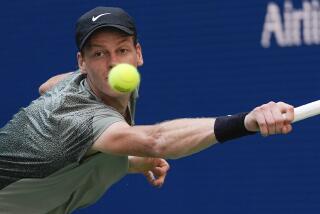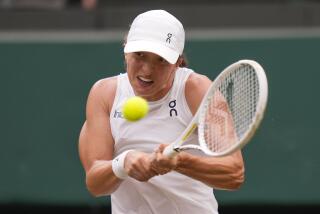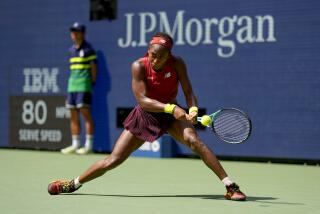Wilander Is Latest Swede to Get Czeched by Mecir
NEW YORK — The man they call “The Killer of Swedes” did in another one Tuesday at the U.S. Open.
Miloslav Mecir of Czechoslovakia beat second-seeded Mats Wilander of Vaxjo, Sweden, 6-7, 6-3, 6-3, 6-4 in the fourth round of the men’s singles at the National Tennis Center at Flushing Meadow. The win by the No. 16 seed was another in a series of upsets here that were not as startling as the rankings’ difference might suggest.
It shouldn’t have come as a surprise. Mecir, 22, has beaten Wilander three of five times. His record against Swedes in the past two years is 17-3. He is 18-8 in his career against the top six-ranked Swedes.
What is it that Mecir likes about the Swedish style? “I don’t know, if I did, I’d not let him beat me,” Wilander said. “I think he likes the way we play. He knows we’re not going to hurt him too much and then he can control the whole match.”
Mecir controls the match by lulling his opponents with deep groundstrokes and then breaking rhythm with a sharp angled shot or a volley.
“It feels like you can move him around from corner to corner, but then suddenly he hits one good shot and then he’s in the point again and then he starts to control the whole point.”
Mecir broke Wilander nine times in the 2-hour, 50-minute match. He also got in 72% of his first serves, which is a good start for a serve and volley style player.
Even with Wilander’s excellent passing shots, he was unable to get around Mecir, who, at 6 feet 3 inches, not only covers the net well but moves from side to side with remarkable speed.
Wilander went quietly from this tournament, which has only 5 of its top 10 seeds left. Wilander is almost serene about his tennis game, his life, his losses. On court, as is the way with the Swedes, Wilander is smooth and cool.
“I knew to play him was going to be very tough,” Wilander said. “So, for me it’s not a big upset. But I think for the people (it is), because he’s not that well known. I’m disappointed, but he makes you play bad. And that’s why he’s a better player than me today.”
Wilander is a gifted and graceful player but not a tenacious, gritty fighter. His game is built around endurance rather than dominance.
More than his style, it has been his approach to professional tennis that is curious, at least to the competitive Americans on the tour. More than once, Wilander and the other Swedes have said that being No. 1 is not as important as enjoying life and making it as full as possible. That means not living just for tennis.
Of late, Wilander has openly discussed asking the Men’s International Professional Tennis Council, which governs the sport, for time off from the tour.
He is intensely private. If it were not for a fine imposed on players who duck press conferences, Wilander would likely never speak to the media.
“It suits me perfect (that he gets little attention in the press),” Wilander said last week. “If you could win every Grand Slam and have no one expect you to win, it would be the best position you could have in life. I get no public attention. I am very glad of that. That’s perfect for me.”
At 22, Wilander has won the French and the Australian Open twice. Yet it seems he is capable of more. Whether or not his temperament will allow it is another matter.
The scene after one of the women’s quarterfinal matches was a study in role reversal. Pam Shriver, the loser, was smiling and effusive. Martina Navratilova, the winner, was subdued and a little sad.
Navratilova had beaten Shriver, 6-2, 6-4, her 26th win against three losses in their series. But the top-seeded woman said she got no pleasure from beating her doubles partner.
“I seem to enjoy it less and less playing her because we are such good friends,” Navratilova said. “I seem to feel the strain now more. It’s not an enjoyable win.”
Shriver said she enjoyed the match.
“I have a blast out there, I love it,” Shriver said. “It was a long match, and I felt like I had more opportunities today than I’ve had in the last couple of matches against her. Opportunities . . . it’s not like you’re going to have 20 of them. And you’ve got to make good on your five or six solid opportunities.”
Navratilova plays third-seeded Steffi Graf, who needed only 47 minutes to beat Bonnie Gadusek, 6-3, 6-1, in the other quarterfinal match Tuesday night.
Open Notes
Boris Becker continued his roll toward the final by beating Gary Donnelly, 6-4, 6-3, 6-7, 6-4. Donnelly, from Scottsdale, Ariz., has been the surprise American in this tournament. Donnelly, ranked No. 211 in the world, was the only qualifier left. In the match, Becker dived and rolled on the hard court like it was grass. After the match his knees and shins were bloody. The first question in the post-match interview was, “How are your knees, Boris?” “They’re still perfect,” Becker replied. “How about your game?” he was asked. “Almost perfect,” Becker said. . . . Becker is the youngest Open quarterfinalist in the open era (since 1968). He is the first West German ever to make it to the quarterfinals of this tournament.
More to Read
Go beyond the scoreboard
Get the latest on L.A.'s teams in the daily Sports Report newsletter.
You may occasionally receive promotional content from the Los Angeles Times.











